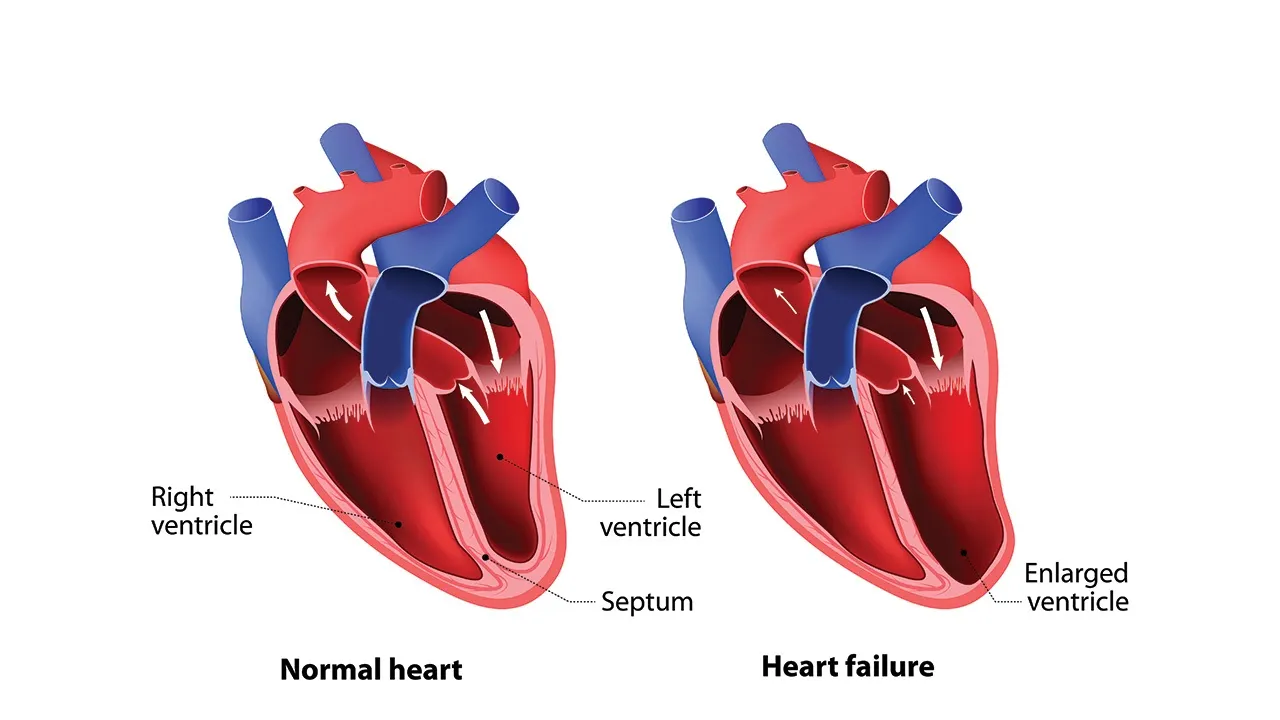Heart Failure
Heart failure is a life-threatening condition affecting millions of people in India annually. It occurs when the heart cannot pump enough blood and oxygen to the body, resulting in Symptoms such as shortness of Breath, Fatigue, and difficulty performing everyday activities. Understanding how to reduce your risk of developing Heart Failure can save your life.

Recent statistics show that in India, 20% of adults have hypertension, 7% are obese, and 11% have diabetes mellitus, all of which increase the risk for Heart Failure.
According to the World Health Organization’s Global Adult Tobacco Survey, India 2017-2018 study, 39% of adults smoke cigarettes or use smokeless tobacco products – another leading contributor to cardiovascular disease and heart failure.
These figures demonstrate the prevalence of conditions associated with an increased risk of Heart Failure among Indian citizens underscoring the importance of increasing awareness about this potentially deadly condition and highlighting the need for prevention measures to be taken at an individual and collective level.
Your heart deserves the best care possible, especially when it comes to any Heart-Related Conditions. Look no further than Cardiomet Clinic we offer you the Best Heart Failure Treatment in Pune.
Symptoms
Heart failure is associated with various symptoms affecting a patient’s quality of life. The most common symptoms include shortness of breath, fatigue, and swelling in the legs or ankles.

Shortness of Breath can make it difficult for patients to complete daily activities such as walking up stairs or climbing hills.
Fatigue can cause patients to feel exhausted even after minimal physical activity, leaving them unable to perform their usual tasks. Swelling in the legs or ankles is often caused by fluid buildup due to reduced circulation, which can cause pain and discomfort.
Patients must seek medical attention if they experience these symptoms, which may indicate other underlying conditions such as hypertension or diabetes mellitus. Early diagnosis and treatment can help prevent more serious complications down the line.
Take control of your Heart Health.Don't let Symptoms. Seek the safe and Comprehensive Care Provided by Cardiomet Clinic's Heart Surgeons in Pune.
Causes
Several different conditions and lifestyle factors can cause heart failure. Heart disease, high blood pressure , and diabetes are all known to increase the risk of developing heart failure. Additionally, tobacco use, excessive alcohol consumption, and a sedentary lifestyle can also contribute to the development of this condition.
Smoking increases the risk of cardiovascular disease, including coronary artery disease, which can lead to heart failure. Heavy drinking can weaken the heart muscle, making it less efficient at pumping blood throughout the body.
leading an inactive lifestyle puts people at Greater Risk for Hypertension and obesity, which can raise their chances of developing Heart Failure. Understanding these causes is key to preventing this life-threatening condition.
Discover the intriguing Contrast Between Systolic Heart Failure, where the heart's pumping power wanes, and Diastolic Heart Failure, where the heart struggles to relax and fill effectively.
Grasping the Nuances of these Distinct Heart Conditions is vital for Precise Diagnosis and tailored treatment strategies. Let us unravel the complexities and provide you with the comprehensive care you deserve at Cardiomet Clinic, home to top-Notch Heart Failure Treatment in Pune.
Diagnosis
Heart failure can be Diagnosed through medical imaging tests, Physical exams,and Laboratory tests. Common imaging tests for heart failure include echocardiograms (ECGs), X-rays, and cardiac MRI scans.
These tests provide information about the size and function of the heart, which can help identify signs of heart failure, such as an enlarged or weakened left ventricle.

In addition to these imaging tests, patients may also be required to undergo other diagnostic procedures such as electrocardiography (EKG) and stress testing. A doctor may also ask questions about a patient’s medical history and lifestyle habits to better understand their condition.
Getting an accurate diagnosis is essential for helping patients understand their condition and make informed decisions about treatment options.
An Accurate Diagnosis can help Doctors create individualized treatment Plans tailored to each patient's specific needs. Are you familiar with the various stages that occur in Congestive Heart Failure?
Cardiomet Clinic is a Leading Destination for Heart Failure Treatment in Pune, Offering state of the art care delivered by renowned Heart Specialists. With a Deep Understanding of Cardiac Conditions, our dedicated team works tirelessly to provide the highest level of care, ensuring optimal outcomes and improved heart health for our patients.
Treatment
Treatments for heart failure vary depending on the severity of the condition and individual patient needs. Commonly prescribed medications include diuretics to reduce fluid accumulation in the body, ACE inhibitors to relax blood vessels and reduce strain on the heart, beta blockers to slow down a rapid heartbeat, and digoxin to increase the pumping strength of the heart.

In addition to medications, lifestyle changes may be recommended, such as quitting smoking, reducing alcohol consumption, maintaining a healthy weight, regular exercise, and eating a balanced diet with less salt. These changes can significantly improve a patient’s quality of life.
Surgical procedures are sometimes necessary for more severe cases of heart failure. Common surgeries include implantable cardioverter-defibrillators (ICDs), which can deliver electric shocks when needed to treat irregular heart rhythms, prosthetic valves, which replace faulty or diseased valves with artificial ones, cardiac surgery to repair valve defects or blocked coronary arteries and heart transplants where healthy donor heart is used to replace a damaged one.
Heart failure treatments have been successful in helping many patients regain their health and live an active life. There are numerous Success Stories of patients whose lives were saved through quick diagnosis and timely treatment of their condition.
Living with Heart Failure
Living with heart failure can be a challenging experience, but there are many strategies for managing the condition daily. Diet is especially important for those with heart failure; patients should reduce their salt and fat intake, eat more fruits and vegetables, and avoid processed foods.
Regular exercise can help strengthen the heart and improve overall health, although talking to your doctor before starting any new exercise program is important. Additionally, keeping track of medications is essential for managing symptoms as your cardiologist prescribes.
Managing symptoms of heart failure can also be difficult at times. Things like shortness of breath, fatigue, and swelling in the feet or legs can be common issues. To help manage these symptoms, patients must rest often and contact their doctor if they experience chest pains or unusual body changes.
Finally, patients must seek support from loved ones and qualified cardiologists when living with heart failure. Talking about how you feel with people you trust or seeking expert advice from your doctor can make a big difference in how patients cope with the condition.
And Heart Attack is caused by a blockage in the blood vessels supplying the heart, while Heart Failure is a condition where the heart is unable to pump enough blood to meet the body's needs. But Are You Curious About Difference between Heart Attack and Heart Failure
Conclusion
Heart failure is a serious medical condition that can severely impact the quality of life. Treatment options vary depending on the severity and may include medications, lifestyle changes, and surgical procedures. Patients should talk to their doctor about which treatment option is best for them and follow the prescribed plan.
It’s also important for patients to follow a healthy diet, exercise regularly, and track their medication intake. Symptoms of heart failure, such as shortness of breath, fatigue, or swelling in the feet, should be monitored closely and discussed with your doctor if they become more pronounced or frequent.
Finally, we encourage patients to seek help from loved ones and qualified cardiologists when living with heart failure – talking with people you trust or seeking expert advice from a doctor can greatly improve coping with the condition. If you are experiencing any symptoms of heart failure, we urge you to seek medical attention immediately at our heart clinic.


